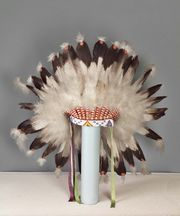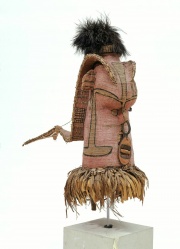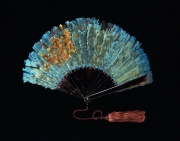Difference between revisions of "Feather"
(→Risks) |
|||
| (2 intermediate revisions by the same user not shown) | |||
| Line 5: | Line 5: | ||
The stiff, lightweight, often colorful, [[keratin]] structure that is the principal covering of birds. Feathers are composed of a central, hollow [[quill]] that attaches to the bird's body. For flight feathers, each side of the quill (vane) has a series of slender, closely spaced barbs that interlock to form a continuous, flat surface. Plume feathers (e.g., [[ostrich]], [[peacock]]) are less cohesive with unconnected barbs. [[Down]] feathers, obtained from young birds or the undergrowth of adult birds, are soft and lack barbs. Feathers naturally occur in a wide variety of colors pigmented with melanin (black to yellow) and [[carotenoid|Carotenoids]] (red and yellow). Most birds periodically drop feathers as part of a molting process. Feathers and quills have been used since ancient times for decoration, clothing, masks, and as writing utensils. The fashionable use of feathers in the 19th century directly resulted in several bird preservation laws (e.g. [[eagle]]). | The stiff, lightweight, often colorful, [[keratin]] structure that is the principal covering of birds. Feathers are composed of a central, hollow [[quill]] that attaches to the bird's body. For flight feathers, each side of the quill (vane) has a series of slender, closely spaced barbs that interlock to form a continuous, flat surface. Plume feathers (e.g., [[ostrich]], [[peacock]]) are less cohesive with unconnected barbs. [[Down]] feathers, obtained from young birds or the undergrowth of adult birds, are soft and lack barbs. Feathers naturally occur in a wide variety of colors pigmented with melanin (black to yellow) and [[carotenoid|Carotenoids]] (red and yellow). Most birds periodically drop feathers as part of a molting process. Feathers and quills have been used since ancient times for decoration, clothing, masks, and as writing utensils. The fashionable use of feathers in the 19th century directly resulted in several bird preservation laws (e.g. [[eagle]]). | ||
| − | For detailed information on | + | For detailed information on the feather structure, identification deterioration and care, please see the AIC Wiki for: |
* Feathers (Objects Specialty Group): [https://www.conservation-wiki.com/wiki/Feathers Feathers] | * Feathers (Objects Specialty Group): [https://www.conservation-wiki.com/wiki/Feathers Feathers] | ||
| Line 15: | Line 15: | ||
== Risks == | == Risks == | ||
| − | Many natural and synthetic colors in bird feathers are not lightfast. | + | * Many natural and synthetic colors in bird feathers are not lightfast. |
| + | * Feathers are susceptible to insect damage and contamination by frass and dirt. | ||
| + | * Mechanical damage includes breakage, vane loss, barbule disruption and bending. | ||
| + | |||
== Physical and Chemical Properties == | == Physical and Chemical Properties == | ||
Latest revision as of 13:29, 5 October 2024
Description
The stiff, lightweight, often colorful, Keratin structure that is the principal covering of birds. Feathers are composed of a central, hollow Quill that attaches to the bird's body. For flight feathers, each side of the quill (vane) has a series of slender, closely spaced barbs that interlock to form a continuous, flat surface. Plume feathers (e.g., Ostrich, Peacock) are less cohesive with unconnected barbs. Down feathers, obtained from young birds or the undergrowth of adult birds, are soft and lack barbs. Feathers naturally occur in a wide variety of colors pigmented with melanin (black to yellow) and Carotenoids (red and yellow). Most birds periodically drop feathers as part of a molting process. Feathers and quills have been used since ancient times for decoration, clothing, masks, and as writing utensils. The fashionable use of feathers in the 19th century directly resulted in several bird preservation laws (e.g. Eagle).
For detailed information on the feather structure, identification deterioration and care, please see the AIC Wiki for:
- Feathers (Objects Specialty Group): Feathers
Synonyms and Related Terms
featherwork; feathers (pl.); fjer (Dan.); Feder (Deut.); pluma (Esp.); plume (Fr.); penna (It.); veer (Ned.); fjær (Nor.); pióra ptaka (Pol.); pena (Port.)
Risks
- Many natural and synthetic colors in bird feathers are not lightfast.
- Feathers are susceptible to insect damage and contamination by frass and dirt.
- Mechanical damage includes breakage, vane loss, barbule disruption and bending.
Physical and Chemical Properties
- Insoluble in organic solvents.
- Burns giving odor of burnt hair.
- Becomes limp in boiling water.
Additional Images
Resources and Citations
- Bishop Museum: Care of feathers
- O. Untracht, Jewelry Concepts and Technology, Doubleday & Co., Inc., New York, 1985.
- The Dictionary of Art, Grove's Dictionaries Inc., New York, 1996 Comment: "Feather" Allyson Rae
- Rosalie Rosso King, Textile Identification, Conservation, and Preservation, Noyes Publications, Park Ridge, NJ, 1985
- Encyclopedia Britannica, http://www.britannica.com Comment: "feather." Accessed. 9 Nov. 2004 .
- Oppi Untracht, Jewelry Concepts and Technology, Doubleday & Co., Inc., New York City, 1985






